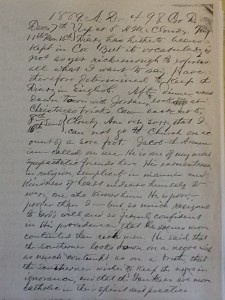What I gathered from this weeks readings, as well as our class discussion and years of exposure to popular media, was the extreme notion that people are all different. I know this might come as a big to surprise to everyone (and all sarcasm aside, I think it actually does surprise some), but unless we are planning to write 7 billion new laws to give or deny permission for the controversial choices of each unique individual, some concessions are going to have to be made.
There is no cookie cutter outline for gender or sexuality that is going to satisfy America. We have men and women and every possibility in between. The gender we assume is not always the case and for many, that can be scary. We assign gender roles that detract from the true nature of certain individuals and we critique those who cross gender lines. In some cases, we react differently toward individuals of opposite genders even as they pursue the same acts. As an example, let’s examine the point introduced by Schwartz and Rutter about the variance in socially acceptable acts and tendencies across genders. Boys and girls are traditionally assigned to blue and pink things at a young age. While there seems to be little harm in that, societal pressures increase as children reach puberty. In middle school, you don’t see many boys wearing pink shirts or girls that play football. Girls that still play rough with the boys are met with a disapproving look by their mothers and often proudly take on the title of “tomboys.” As puberty ends, men take on a new role of the aggressor, the pursuant who is expected to be bold and forward; women are expected to resist and retain an exterior innocence.
This is all well and good, if that’s the kind of thing you’re looking for. I find assertive guys attractive and I’ll admit that looking back, I am embarrassed by the tomboy I chose to be before I learned how to dress like a girl.
The problem, however, is that this viewpoint escalates. It can destroy the lives of those who do not meet the standards we now expect of adults. There is a double standard for men and women in regard to sexual behavior. Men are socially expected to be aggressive and extreme in sexual acts while women who are expected to be loyal and respectable. This has recently been an issue in the pop culture media as people express outrage in the “Trampire vs. Chris Brown” debate. Essentially, Kristen Stewart was trashed by fans and the media for her infidelity in her relationship with co-star Robert Pattinson, Cosmopolitan’s hottest guy of the year; around the same time, Chris Brown’s newest album was released and more media attention was given to his continued success despite being convicted of assaulting his equally famous girlfriend three years prior.
The point is not that either of these actions deserve our attention. I simply wish to point out the disparity in social opinion as the general public trashed the female offender and still praises the male.
While on the topic of judging actions with a gender-bias, I wish to explain my opinion on a comment made in class on Tuesday. Briefly after discussing varying sexuality, the frequent occurrence of female/female public displays while “partying” in our generation and environment was mentioned. While I find the physical interaction of all sexualities acceptable, the question that arose related to the motivation behind this form of PDA. At Emory, like every where else, we have people that range from 1 to 6 on the Kinsey scale identifying as homosexual, heterosexual or varying levels of bisexual. In recognition of the rights of these individuals, I fully support equal acceptance of PDA from all couples. I think it’s an expression of desire and confidence in a relationship and personally enjoy the feeling of openly displaying my relationship. In class, however, Dr. Troka posed the question, “does it matter if they’re lesbian or straight?” Most people said no without pause. I disagree. I honestly believe there is a fundamental problem created by encouraging female displays for the entertainment of men.
It’s often said that the sexuality of women is much more fluid than that of men. While statistically this is supported by the research that was surmised during the 1990’s, I think the effects of social culture reinforces this mentality. Straight men, and perhaps some women, are threatened by the idea of male/male intimacy. Therefore, I think the strictness of identifying as either homosexual or heterosexual is a way to avoid some of the judgment that men who are attracted to men often face. The same intimacy shared by two women however, can be passed over as entertainment by men and often viewed with curiosity or alternatively disdain by other women, depending on the environment.
Many people experience societal pressure, imagined or real. As a formerly (and sometimes still) awkward person, my personal goal is to arrive at acceptance. Sexual identity is very personal and I think we owe it to each other to find a way to support every individual that enters our lives in their evolving, or fulfilled identity.

